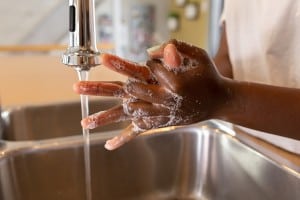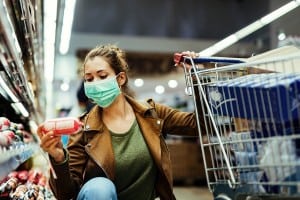As our community begins to get back to business starting this week, it is more important than ever to take common-sense steps to protect yourself and others against COVID-19.
Continue to be vigilant about social distancing, wearing face coverings, washing your hands and more.
If you do feel sick, call your health care provider so they can advise you of your next steps.
Shelby County is starting to get back to business this week – but that doesn’t mean back to normal. As the community begins to reopen in phases, it is more important than ever to take common-sense precautions to keep yourself and others safe from COVID-19.
Regional One Health encourages residents to proceed with caution and continue to do their part to keep the virus from spreading. Here are some tips everyone can use to stay safe and healthy:
Continue to be vigilant about social distancing
Social distancing, i.e. avoiding close contact with people who don’t reside in your home, remains the best proven method of preventing the spread of COVID-19.
While more businesses will be opening in the days ahead, many will be operating with restricted access and lower capacities than usual.
Consumers should take a similar approach. Limit your trips outside the home to the most essential outings rather than going from place to place. The fewer people you encounter, the less chance you have of being exposed to or spreading COVID-19.
When you are outside your home, remember to keep a distance of at least 6 feet in all directions between yourself and others. That’s about the length of a household door, an adult-sized mattress or a living room sofa.
Wear a mask to protect yourself and others
Continue to cover your nose and mouth when you are outside your home. COVID-19 is an airborne virus, which means it is spread mainly through person-to-person contact and through respiratory droplets produced when an infected person sneezes or coughs.
A mask is not a guarantee against contracting the virus, but it helps in two ways.

Washing your hands frequently with soap and water for 20 seconds at a time is a great defense against COVID-19.
Some people are positive for COVID-19 but do not know it because they are asymptomatic or not yet exhibiting symptoms. A mask stops infected individuals from spreading the virus because it prevents respiratory droplets from becoming airborne.
For healthy people, wearing a mask offers some protection against the airborne virus.
A cloth mask, scarf or bandana that completely covers your nose and mouth are all effective as barriers against COVID-19.
Wash your hands and don’t touch your face
Washing your hands regularly remains extremely important. Use soap and warm water and wash for at least 20 seconds, getting in between fingers, under fingernails and the back of your hands.
If soap and water are not readily available, use a hand sanitizer with at least 60 percent alcohol.
Also, remember to avoid touching your face, especially your eyes, nose and mouth; and continue to regularly clean frequently used surfaces with household cleaners.
React appropriately if you think you may be ill or exposed
If you think you’ve been exposed to COVID-19 but are not experiencing symptoms, stay home and limit contact with others for 14 days.
If you do start to feel sick, remain calm. Call your health care provider by phone and describe your symptoms. The most common symptoms of COVID-19 are cough, fever and shortness of breath, and patients have also reported loss of taste and smell, fatigue, chills and muscle pain.
For many patients, it is safest to recover at home. If your provider does want you to be seen in person, calling ahead allows them to take precautions during your visit.
If your symptoms are life-threatening, you should go to the nearest emergency room. Call ahead so they can prepare for your arrival.

Wearing a facemask that covers your nose and mouth helps protect you and others from the spread of COVID-19.
Be especially cautious if you are at higher risk
While COVID-19 can affect anyone, patients over age 65 and those with compromised immune systems or pre-existing conditions are at higher risk for severe symptoms.
If you fall into these categories, it is especially crucial that you continue to take precautions and avoid contact with others as much as possible.
If you are not in a high-risk group, consider helping others who are. Running essential errands, such as grocery shopping, for at-risk loved ones and neighbors can help them stay at home.
Stay informed
Please continue to stay informed about COVID-19 and the latest advice to protect yourself and others. The situation continues to evolve and staying informed can help you stay safe.